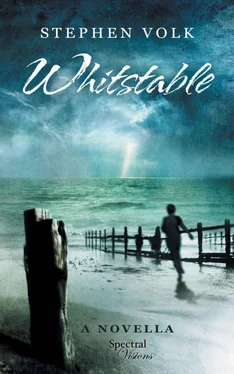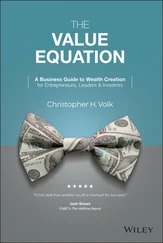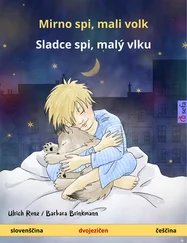Gledhill was still staring at him. A few foolishly courageous seagulls descended in a flurry on the ‘stalker’ in front of him and took stabs at it, one trying to skewer some fish offal in rolled-up newspaper. Gledhill stamped his feet and clapped his hands, yelling sharply and waving his arms to scare them off. “Go! Go! Bloody pests!” Behind him, another fisherman directed a high-powered hose to wash down the flag stones. The gulls took to the skies.
Cushing tapped his shopping basket before walking away.
“Thank you for this. I shall enjoy it.”
* * *
Fetching coal to build the fire for that coming evening, he remembered entering the same way from the garden, closing the door with his foot, finding Helen hunched on the divan looking like a frightened child. “I thought you’d left me.” “I’m not going anywhere,” he’d reassured her. She’d closed her eyes. He’d wrapped a blanket round her and made a fire, as he did now on his knees before the grate. He screwed up sheets of old newspaper in makeshift balls and laid a criss-cross pattern of kindling on top of them.
Maisie Olive had brought tea and said, “She’ll be all right, sir.”
He’d been smoking a cigarette. “Thank you, yes. She’ll be all right.”
At nine o’clock the night nurse helped Helen to bed. The last thing she said, clutching his hand, was, “Goodnight, Peter. God bless you.”
At three o’clock some instinct he could not explain woke him, and he found her skin cold and clammy to his touch. He switched on the light and the electric blanket and went down to make tea. Her pupils were small dots. He fluffed up pillows and prised them behind her. When he returned with the tea, the night nurse was there saying her breathing was painful and then what breathing there was, painful or not, stopped.
The nurse looked at him and shook her head.
He looked down at Helen and saw all pain and suffering gone from her face. She was serene and at peace. The nurse must have seen his stricken features because she extended her arms, then lowered them.
At that moment Cushing had felt nothing, just a supreme hollowness inside. He’d thought, most strangely of all, if this was in a film I wouldn’t be reacting like this at all. I’d be shouting and jumping around and wailing.
“You’d better get dressed now, Mr C,” the night nurse said. He was still sitting in the armchair with the tea tray on his lap and it was daylight.
When the undertakers came, they showed him an impressively shiny catalogue of head stones. Many of them reminded him of the ones made out of polystyrene in the property shop at Bray. He’d been in a few graveyards in his time. Most of them taken apart afterwards to be reconstituted as other sets: barn, ballroom, bedroom. If only life could be dismantled, he thought, remade and reconstructed the way sets were, with a fresh lick of paint, good enough for the camera to be fooled. After looking at the brochure, he’d given the undertaker only one absolute specification for the gravestone: that there be a space left beside Helen’s name for his own.
In that last year her weight had diminished drastically to under six stone, while he himself lost three. It was as if, unconsciously, he’d been keeping pace with her decline, wanting to go with her every step of the way—and beyond, if necessary.
The previous summer he had dropped out of filming Hammer’s To Love a Vampire , the follow-up in the Sheridan Le Fanu ‘Karnstein’ saga (even though the part of occultist schoolmaster Giles Barton had been written for him) because Helen had become gravely ill, yet again.
“No more milk train,” he’d said.
When she’d been rushed to hospital that last time and he’d been telephoned by Joyce at the studios, he was shocked how tired she looked when he arrived at her bedside. It was immediately clear this was not just a case of a few check-ups, as he’d deluded himself into thinking. He’d held her hand tightly and said to her he wasn’t on call the next day and he’d bring in a picnic lunch. She smiled and said that’d be lovely. But when he’d arrived with the wicker hamper, like some character from a drawing-room farce, the nurses had told him he was not to be admitted under any circumstances. The doctors said his wife had had a serious relapse and her heart and lungs were terribly weak. He heard very little after that.
He succeeded by sheer persistence in persuading the specialists to let her home. Nobody precisely said that these coming days were her last, but their acquiescence made it obvious. Cushing shook their hands and thanked them profusely. The Polish doctor long ago had said he feared there were no miracles, and this was clearly what he meant, he knew that now. And he knew his wife would need constant medical assistance for the short, precious time she had left.
He arranged day and night care, and rang his agent to cancel his role in the Mummy picture they’d started shooting. He was not irreplaceable. Other people in this life were.
Now he remembered the crew sending flowers to the funeral.
As families do, of course.
He remembered, too, sitting at her bedside, tears streaming down his face. “I’ve made mistakes. I’ve done things of which I have been entirely ashamed, foolish things… Yet through it all, you have been perfect. You forgave…”
“I told you so many times, my love,” Helen had said. “I never wanted you to feel I possessed you. That was our bargain, remember? What I know doesn’t hurt me, so why on earth should it hurt you? It’s unimportant. Those things simply didn’t happen. You hear?” She’d wiped his cheeks with a corner of the bed sheet. “Not a person in the world could have done for me what you have done… But I’m tired, my darling… I can’t talk now…”
In the bedroom now, all alone, he took the crucifix Helen wore from the jewellery box in front of the vanity mirror where she would put on her make-up every morning.
He placed it deep in the hip pocket of the Edwardian tweed suit made for him by Hatchard’s, the outfitter in the High Street. It was where he bought most of his traditional clothes: caps, cravats, gloves. They knew what he liked there and never let him down. People didn’t let him down, that was the remarkable thing in life. He remembered wearing this, his own suit, when filming I, Monster with Chris Lee. Now he faced another Jekyll and Hyde, another beast hiding under the mask of normality. A clash with evil in which he could only, as ever, feign expertise. Fake it. But at least with the right tools. And in a costume that felt proper for the fight.
Downstairs, the scripts and letters he had trodden over to get in still lay on the mat inside the front door. He picked them up. Clutched them to his chest. They felt full and heavy. Full of words and ideas and powerful emotions, and his chest empty.
“What if I fail?”
She was as clear in his ear as she’d ever been in life.
You shall not fail, my darling… With faith, you cannot fail…
“What faith?”
He faced the closed door to the living room.
Your faith that Goodness is stronger than Evil. It’s what you believe, isn’t it? You always have.
“I know. But is that enough?”
You know it will be. It must be.
He turned the handle and pushed the door ajar.
The room was in darkness as he walked through it. He placed the scripts and cards on the bureau, adding to the pile. He looked at one envelope and held it between his thumb and forefinger. He recognised the handwriting. It was a friend.
So many friends. And yet…
Darling, never fear… You are the one good thing in a dark world… and I am with you…
Читать дальше












